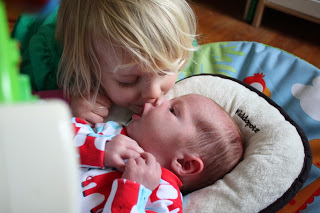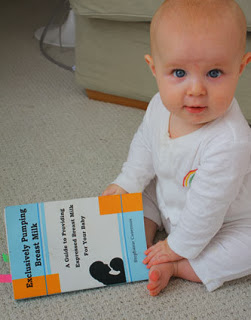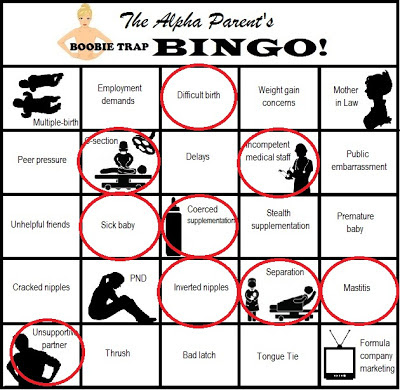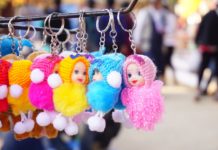 Exclusively pumping breast milk for your baby is univocally better than formula feeding; however it’s not without numerous disadvantages. For baby they include: more wind, more ear infections, reduction in the ability to self-regulate appetite, less comfort, and more risk of being overfed, to name a few. For mothers, the drawbacks include: the inability to sleep during feeds, the need to hire or buy an expensive breast pump, storing and transporting issues, requiring time to pump and time to feed, and of course, the daily ritual of scrubbing pump parts and bottles. So what drives a mother to take such drastic measures?
Exclusively pumping breast milk for your baby is univocally better than formula feeding; however it’s not without numerous disadvantages. For baby they include: more wind, more ear infections, reduction in the ability to self-regulate appetite, less comfort, and more risk of being overfed, to name a few. For mothers, the drawbacks include: the inability to sleep during feeds, the need to hire or buy an expensive breast pump, storing and transporting issues, requiring time to pump and time to feed, and of course, the daily ritual of scrubbing pump parts and bottles. So what drives a mother to take such drastic measures?
Like formula feeders, mothers who choose the pumping route have to come to terms with sacrificing a breastfeeding relationship with their child, yet unlike formula feeders, exclusively pumping moms don’t have the bulk of other mothers to call upon for empathy. Indeed, the gallant road of the wholly-pumping mom is often lonely and burdened by the misinformation and ignorance of others, as the following story illustrates.
“Mai was born on 20th Dec 2008 at 42wks. It wasn’t a straightforward birth and as a result I was unable to hold her for a few hours.
Struggling and understaffed
Right from the start we struggled with breastfeeding. Various midwives tried to help, by forcing Mai onto the breast but this left us both distressed. More than one midwife suggested nipple shields, which we used with mixed success, but then another midwife disagreed. This summed up our time in hospital – I was offered lots of mixed, sometimes conflicting, advice, and no one spent more than five minutes trying to help us. The midwives did not have enough time to spend with each mum, helping them to successfully breastfeed. One midwife mentioned expressing the colostrum. I did this on the first day and fed it to Mai via a syringe. No-one showed us how to use the pump or explained what to do. It was not the start I was hoping for.
Formula
After a day or so a midwife suggested giving Mai some formula due to her becoming jaundiced. We knew from our NCT classes that her stomach would be so small that she would only need a tiny amount so we gave her 10ml. Had we been helped to express, we would have been able to give her breast milk which would have been even more effective at helping her to eliminate the cause of the jaundice.
Weight loss
Once home we continued trying to breastfeed with mixed success – Mai was on and off the breast, not always sucking for long. She had dropped to 7lb from her birth weight of 8lb 3oz. We even had to go out and buy tiny baby size clothes as the clothes which had fitted her in hospital were now too big for her. It was crushing.
The midwife advised topping up with formulato make sure Mai did not lose any more weight. On the 27th December I bought a breast pump and started pumping that day. I got 40ml the first time and it was fascinating to watch the milk squirting out and collecting it in the bottle.
The decision
As pumping was going so well I decided to stop breastfeeding and just exclusively pump. Our health visitor kept telling me that I needed to get her back onto the breast, but after a week of EPing my mind was made up. This is what we were going to do. I found once I had made my decision the pressure from others to breastfeed ceased, however no information or advice about pumping was forthcoming. Logic told me it was possible as it is about supply and demand, the pump was creating the demand instead of a baby but for how long this would work I had no idea.

I was pumping six to seven times a day with lots of help from my husband Paul. We were lucky as he had four weeks paternity leave which helped us adjust to pumping and fitting it into a routine. By the time he returned to work it was just part of what we did. Paul fed Mai in the morning, evening and night while I pumped, then during the day I managed to feed Mai with a bottle of expressed breast milk and pump at the same time. In addition we knew exactly how much milk Mai was feeding and how much I was producing. After her initial weight loss we found this important.
Pumping is a learning curve
We had to top up with formula once a day for the first few months. I know now it was because I wasn’t pumping enough – babies feed on average two hourly for the first few weeks whereas I was only pumping three hourly and not at night. It is essential to pump during the night when pro-lactin, the hormone which is linked to milk supply, is highest; hence why babies feed a lot at night; Mother Nature is a wonderful thing!

After a month or so I started looking into the subject of expressing and I bought a great book called “Exclusively Pumping Breast Milk” by Stephanie Casemore, an American mum, who wrote the book from her experiences. I felt huge relief, recognition and hope – there was a name for what we were doing and others were doing it too, and had done it for over a year!
Lack of information for pumping mothers
The majority of the information I found was on expressing in conjunction with, rather than instead of, breastfeeding, and what little I could find on this topic was mostly from American sites where pumping is extremely common due to maternity leave being only six weeks – so if mothers want to continue breastfeeding they have no option other than to pump. What struck me most about my experience in this area is the lack of awareness, advice and support of pumping.
Some women pump because their babies have to be initially tube fed. If babies are in SCBU or premature often mums are encouraged to express but this is the only time that pumping is encouraged within the NHS (British health system).
Most women who exclusively pump (EP) fall into it when breastfeeding doesn’t work out but for others it can be an active decision as they don’t want to breastfeed but want to give their babies breast milk. EPing makes that possible.
I strongly believe health professionals should talk to mums-to-be and new mums about expressing. There should be a tiered level of advice, concentrating on encouraging and supporting breastfeeding whilst mentioning expressing as a feeding option. Also where mums are not keen to breastfeed or are having difficulties breastfeeding expressing should be discussed as an option before anything else. If mentioned at the right time many more babies would probably get breast milk for longer.
Health professionals not following guidelines
All NHS hospitals should be following the NICE guidelines, which clearly state that all mothers should be taught how to hand-express their milk. If there are problems with the baby, mum should be supported to express by hand or pump and given information for storage and freezing of expressed milk. The NICE guidelines also state that formula milk should only be given if there is a sound medical reason for doing so. The fact that many midwives may not mention expressing to a struggling mum is probably because they haven’t read the guidelines! Breast milk regardless of how its fed is beneficial for babies and more mums may express if they realised it was a viable long term option. Everyone understands that ‘breast is best’ but many people have never heard of EPing as an option, so it’s assumed that if you are not breastfeeding then you must be giving formula. EPing is the next best thing if breastfeeding doesn’t work out or a mum doesn’t want to breastfeed for whatever reason.
Tongue tie and lip tie: the decision not to cut
At around a year or so I noticed a gap in Mai’s top teeth and did a bit of online research and discovered she has a lip tie, this can be an indicator of a tongue tie, a condition which affects the ability to latch onto the breast and also gives a high palate shape due to its formation in the womb. We took her to a private paediatric surgeon at around 18 months and he confirmed she had a tongue tie and a lip tie. We decided on his advice that we would take no action as she was able to speak well and also able to stick her tongue out and he felt the risks of a general anaesthetic were greater than the benefits as it was no longer causing feeding issues and the likelihood that it would in the future was slim. She does snore very loudly and is prone to tonsilitus both likely due to the shape of her oral cavity. She has also been tested for sleep apnea which was borderline but ok. Another symptom of her tongue tie is that she is very slow at eating and we noticed this particularly on vacation with 2 other children the same age. I assume she struggles to move the food about her mouth so it takes her longer and then she just seems to get bored!
Pumping in public
I really did get so much easier past the 6 month mark and I dropped a session, I used to pump in the car with OH driving to visit people, my trusty pump came out on day trips, I pumped at friends houses and in front of visitors at my house, it was just what I had to do! It’s far harder than breastfeeding to be discreet whilst pumping but I had some good nursing tops and always wore scarves which were handy for covering the pump!
The end of pumping
I found it difficult emotionally when the time came to stop. I had put in all the hard work getting my supply going and had spent many months knowing it was my milk growing her. My pumping capacity reached a peak just before solids were introduced at 6 months. Then, Mai’s milk intake dropped so it became far easier and I pumped 4 times a day then after another few months 3 times day. After that each time my periods returned my supply dipped and didn’t quite come back to capacity. I dropped to 2 a day and was making around 180ml which Mai had in a cup morning and night. It was no bother pumping first thing after breakfast and again before bed, but it gradually slowed down to 100ml. I wound down my morning pumping session by a few mins a day it was just 5 mins, then stopped that one. I then did the same with the other session. I carried on doing it every other day for a week. It felt fine, I felt fine. I guess as it followed natural weaning of bf. I had exclusively pumped for 21 months!”

Click here to read the story of another exclusively pumping mother.
Click here to read the story of a mother that switched from exclusive pumping to exclusive breastfeeding.
Get your own blank Bingo Card here.
Email me with your story to appear on Triumphant Tuesday!










